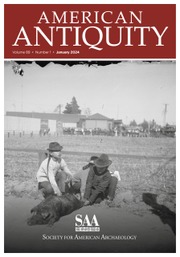No CrossRef data available.
Article contents
What, Really, Were Gorgets?
Published online by Cambridge University Press: 20 January 2017
Abstract
The most unsatisfactory artifact names are those which imply some definite but essentially imaginary function. Those who use such names may confess that they have no proof of this function, but they often defend their position by citing the belief-excusable even when unfounded - that a name of such importance would not have been accepted without sufficient investigation. It is suggested that the term gorget was ultimately derived from the name applied to a metal military ornament used in the 18th century.
Information
- Type
- Facts and Comments
- Information
- Copyright
- Copyright © The Society for American Archaeology 1965
References
Déchelette, Joseph
1910
Manuel d’Archéologie, Tome II. Auguste Picard, Editeur. Paris.Google Scholar
Fowke, Gerard
1896
Stone Art. Thirteenth Annual Report of the Bureau of American Ethnology, pp. 47–178. Washington.Google Scholar
Robertson, R. S.
1878
Gorgets, or What?
American Antiquarian, Vol. 11, p. 100. New York.Google Scholar
Shepard, Anna O.
1957
Ceramics for the Archaeologist. Carnegie Institution of Washington, Washington.Google Scholar
Woodward, Arthur, 1926
Indian Use of the Silver Gorget. Indian Notes, Museum of the American Indian, Heye Foundation, Vol. 3, No. 4, pp. 232–49. New York.Google Scholar

